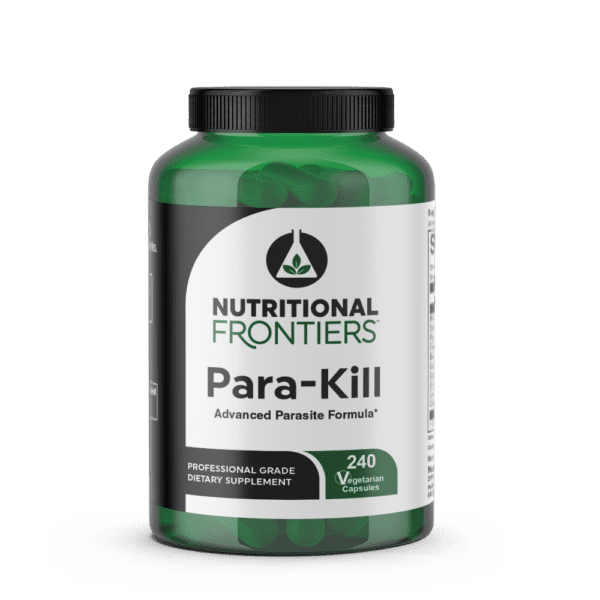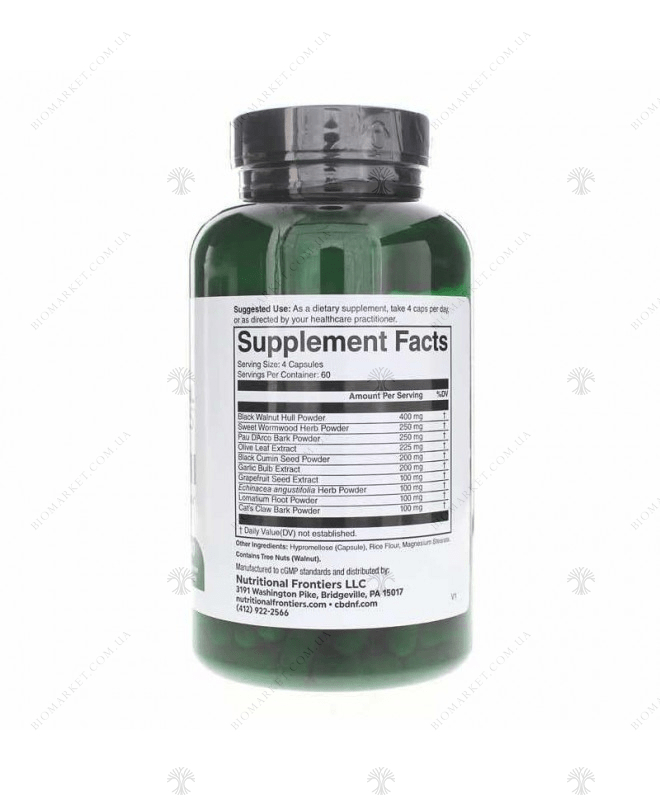Nutritional Frontiers
Para-Kill 240 ct.
Para-Kill 240 ct.
Couldn't load pickup availability
Description
Para-Killis a blend of herbal extracts formulated to provide intestinal and immune support. This should be taken only under supervision of your healthcare provider. Once you and your healthcare practitioner have tested and determined the presence of microbial imbalance in the intestines, Para-Kill may be part of your protocol to help restore intestinal balance.
Benefits
About the Ingredients:
Black Walnut Hull (Juglans nigra) has an affinity for the gastrointestinal tract and has been used to alleviate liver dysfunction, reduced appetite, and both constipation and diarrhea. Various parts of these trees are used medicinally, including the walnut hulls and the bark. Juglans species may be used both internally and topically and appear to possess anti-inflammatory , anti-microbial, and anti-parasitic properties.
Wormwood (Artemisia annua) is a shrubby perennial that grows all over the world and is treasured by herbalists for its bitter, anti-microbial, and anti-helminthic actions. Wormwood has been used against roundworms, pinworms, Plasmodium (the species that causes malaria), and Schistosoma species. The main active components of Artemisia annua that have been isolated and studied for these purposes are artemisinins.
Pau d’arco, also called Tabebuia avellanedae, is a South American plant used by herbalists to help both acute and chronic illnesses including infections, arthritis, and cancer. Indigenous people in Central and South America as well as Caribbean healers use pau d’arco for infectious diseases, sexually transmitted diseases, wounds, and other health conditions. Some of the active chemicals in pau d’arco that have been isolated by scientists include the naphthoquinones lapachol and beta-lapachone, which have been shown via in vitro studies to kill some bacteria, viruses, fungi, and parasites.
Echinacea species like Echinacea angustifolia and purpurea are well known for assisting the body in recovery from acute infections. Echinacea is a wildflower native to North America and was used by some Native American tribes to treat venomous bites, infectious diseases, and wounds. It activates white blood cells and modulates the immune system. Echinacea demonstrates anti-viral, ant-bacterial, anti-fungal, and anti-parasitic properties in various research studies. Echinacea preparations also support the body’s anti-inflammatory and antioxidant responses which assist in healing from infections and restoring normal redox status.
Lomatium Root is native to western North America and contains a variety of active constituents like saponins, resins, glycosides, and volatile oils. It is believed to fight all manner of infections as well as having an immune-modulating effect on the immune system.
Olive Leaf Extract has been used by herbalists and in traditional folk medicines for many years to treat a variety of conditions. The olive tree is a small, evergreen tree native to the Mediterranean region. Research has confirmed its use in fighting a variety of infections including parasites, bacteria, and fungi. For example, some animal and in vitro studies revealed olive leaf’s antiparasitic activity in combating cryptosporidiosis and leishmaniasis. Research also shows olive leaf to demonstrate antifungal and antibacterial potential. Olive leaves not only possess antimicrobial characteristics, but also demonstrate antioxidant activity.
Grapefruit Seed Extract was discovered by an American immunologist in 1980. It has been used to combat Candida and other infections. An in vitro study conducted in Poland showed that grapefruit seed extract exerted potent antifungal activity against various Candida yeast strains.
Garlic has been revered for thousands of years as a culinary and medicinal plant. Garlic is mentioned in the Bible, the Talmud, and by ancient physicians such as Hippocrates, Galen, Pliny the Elder, and Dioscorides. Garlic is often included in anti-microbial formulas. Modern research confirms its traditional use in fighting infections and parasites.
Black Cumin (Nigella Sativa) seed is native to north Africa, southern Europe, and southeast Asia. The seeds contain many active compounds like thymoquinone, thymohydroquinone, thymol, carvacrol, linoleic acid, and more. Historically, nigella was used to treat a wide variety of health conditions. Modern research has demonstrated that black cumin seed may be effective against bacteria, fungi, and some parasites. It also has antioxidant, anti-inflammatory, and immunomodulatory effects.
Cat’s Claw Bark (Uncaria Tomentosa), also called uña de gato, is a South American medicinal vine found primarily in the Andes mountains. Indigenous peoples of the Peruvian rainforest have used Uncaria for helping people with arthritis, asthma, fevers, ulcers, wounds, menstrual regulation, general weakness, and detoxification. Cat’s claw possesses various anti-inflammatory, immune stimulating, & protective effects as well as demonstrating biological activity against various microorganisms and parasites.
Share




